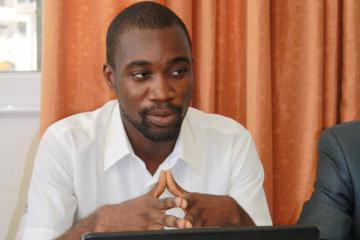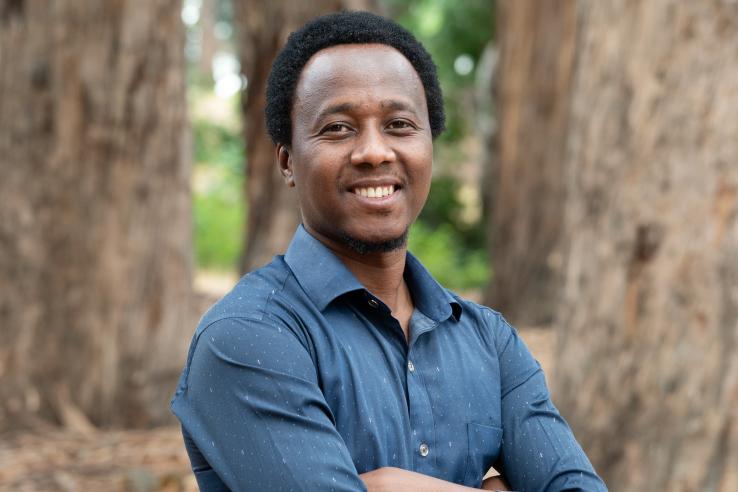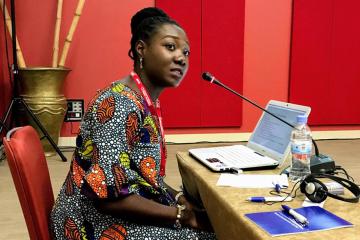
African Scholar Spotlight: Zakayo Zakaria

This post is part of our ongoing series showcasing the work and perspectives of economists from the African continent who are leading randomized evaluations. Through our African Scholars Program, we hope to help create more opportunities for African researchers to advance the research agenda on the continent through randomized evaluations. In this spotlight, we speak with Zakayo Zakaria, research fellow and Monitoring and Evaluation Expert at the Economic and Social Research Foundation (ESRF) and a PhD student in Economics at the University of Dar es Salaam.
What drew you into the field of development economics and in particular, working with impact evaluations?
Friends, mentors, and colleagues have largely contributed to directing me toward a career in development economics. During my undergraduate studies, I had the opportunity to participate in practical training at the Economic and Social Research Foundation (ESRF). It was here that my passion for research and real-world economics truly ignited. Being involved in several practical aspects of economic research, I developed an interest in understanding the complexities of development economics. This newfound passion led me to see ESRF as an ideal place to advance my career.
At ESRF, I had the privilege of meeting Constantine Manda, who played a pivotal role in shaping my career trajectory. Through a one-week training course, he introduced me to impact evaluation methodologies. This introduction was transformative, as it not only deepened my understanding of research but also opened my eyes to the importance of evaluating the effectiveness of development interventions. Additionally, I had the opportunity to work with Constantine on a consultancy project evaluating the impact of the Zanzibar Universal Pension Scheme, a proposal I successfully wrote with ESRF's support. This was my first experience with impact evaluations. Thereafter, I continued to collaborate and receive mentorship from Constantine. He further introduced me to invaluable opportunities to hone my skills and solidify my dedication to impact evaluation in development economics.
I have also found immense motivation by reading the works of renowned development economists such as Abhijit Banerjee, Esther Duflo, Ted Miguel, and Rachel Glennerster. Their pioneering research and innovative approaches to tackling poverty and economic development have inspired me. Their contributions to the field demonstrate the profound impact that rigorous, evidence-based research can have on policy-making and improving lives. This furthered my passion for development economics and my commitment to utilizing impact evaluations as a tool for social and economic transformation.
What are your broad research interests?
My research interests are in the areas of development economics, food security and nutrition, Africa’s aging population (old-age pensions), and field experiments.
What are you using initiative funds to do? What research question are you trying to answer and how does it relate to your context?
Through funding from J-PAL’s Learning for All Initiative (LAI), together with colleagues, Tukae Mbegalo and Nneka Osadolor, we intend to evaluate the impact of play-based learning on early childhood development (ECD) in rural Tanzania. The primary research question we aim to answer is: How do play-based interventions influence foundational literacy, numeracy skills, and non-cognitive skills in under-resourced communities? Through this evaluation, we hope to inform policy decisions that can improve ECD for 2- to 4-year-olds in under-resourced communities.
What do you see are the big unanswered research questions in your context that RCTs may be able to help answer? Does this relate to any projects you are excited to work on in the future?
The long-term impact of ECD interventions on broader life outcomes such as employment and health, especially in low-income countries, is an area that requires rigorous research. Given that recently much attention has been given to primary, secondary, and tertiary education, early childhood interventions may also provide significant benefits that last well into adulthood.
Additionally, I am interested in interventions targeting the elderly population in Africa. Because this population is rapidly growing across the continent, there is a growing need to understand how health, social, and financial interventions can improve the quality of life for the elderly. Conducting randomized controlled trials (RCTs) in this area could help provide evidence on the most effective ways to support aging populations.
How has the support you have received from J-PAL to date assisted you in your career? How can organizations like J-PAL continue to build on the support they provide to local researchers in running randomized evaluations?
Support from J-PAL has been instrumental in my career growth. Beyond the funding, I have also benefited from several training programs offered by J-PAL, including a summer school on development methodologies held in Morocco in 2023. These opportunities have deepened my understanding of impact evaluation techniques and sharpened my ability to design and implement randomized evaluations effectively.
J-PAL should continue to support African Scholars by providing mentorship opportunities that allow Scholars to collaborate with experienced researchers.
Do you have advice to offer other young aspiring African scholars thinking about a career in economic research?
It is good to do something that will positively impact the development and policy landscape in our country and continent. Decisions informed by research will lead us to sustainable development. Therefore, developing a strong foundation in research for young aspiring scholars is vital. To do this, they will need to actively seek and apply to various learning opportunities, including fellowships, training courses, workshops, and conferences.
What advice would you give to scholars who are considering applying to J-PAL for funding?
J-PAL funding targets solving real-life problems through rigorous research methods. Therefore, it is important to develop a well-thought-out and feasible research question when applying for J-PAL funding. I encourage scholars to apply for J-PAL funding because they go beyond research funding, they also match funded teams with mentors who they can collaborate with and who are well-experienced in impact evaluations. For our LAI-funded project, our team has been connected with J-PAL-affiliated professor James Habyarimana.
What surprised you the most about how the funding process works?
In my experience with applying for funding from LAI, the support I received at every step of the application process from the J-PAL team was immense. I received guidance and assistance that enabled me to submit a competitive application. This was done by organizing pre-proposal calls with teams to explain and clarify issues identified in my letter of interest and to provide tips to avoid common mistakes. Additionally, if I had any questions, they always gave me helpful responses.


